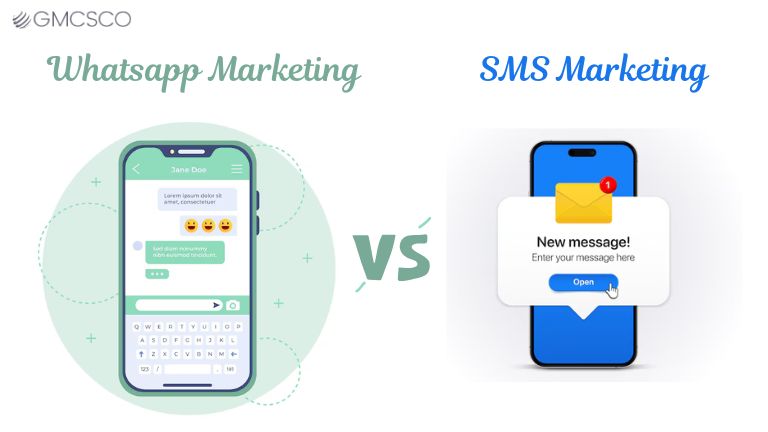
In the present digital world, businesses are constantly looking for new ways to reach their customers. WhatsApp marketing and SMS marketing are among the most powerful and most affordable channels. These two channels have really changed the way brands reach consumers, allowing for fast, direct, and highly engaging communication. But to select either of them, you have to have the basic knowledge of both of their features, strengths, weaknesses, and where you can apply both of them.
In this blog, we will discuss WhatsApp marketing and SMS marketing, the advantages and disadvantages of each of them, and some practical tips on how to choose the right marketing tool for your needs.
How WhatsApp Marketing Works
WhatsApp is a messaging platform that has a massive 2 billion+ users worldwide. WhatsApp allows businesses to deliver a message, news, promotion, etc., directly to their chat with the customer. It even provides a variety of business-oriented tools, such as WhatsApp Business API, which enables brands to automate, filter, as well as respond to messages at scale. WhatsApp marketing seems particularly appealing due to its multimedia abilities, user-friendliness, and consumers’ familiarity with the app. A bulk WhatsApp service provider in India can help businesses send bulk messages quickly, reaching a wide audience.
Strengths of WhatsApp Marketing
- Rich Media Capabilities: WhatsApp lets businesses share not only text but also images, videos, PDFs, and links, which significantly enhances engagement.
- High Engagement Rates: WhatsApp messages have a high open rate, often over 90%, due to its real-time notifications and prominence on mobile devices.
- Personalization Options: Businesses can personalize messages using WhatsApp Business API, tailoring experiences with customer names, purchase history, and other data.
- Global Reach with Local Resonance: With a strong user base globally, especially in India, Brazil, and Europe, WhatsApp is ideal for brands aiming for regional and global outreach.
- Business API for Automation: WhatsApp’s API enables automated replies, customer updates, and transactional messages, streamlining communication.
Weaknesses of WhatsApp Marketing
- Compliance and Permissions: WhatsApp requires user consent before sending messages, with non-compliance leading to account suspension.
- WhatsApp Business API Costs: While the regular WhatsApp app is free, the Business API service costs may be a barrier for smaller companies.
- Limited Reach without Internet: WhatsApp requires internet, limiting its reach in low-connectivity areas.
- User Fatigue Risk: Excessive messaging can lead to fatigue or opt-outs, as users expect personal, meaningful interactions.
What Is SMS Marketing
SMS marketing has been a reliable channel for mobile marketing for decades. SMS, available on all mobile phones, is independent of the internet, making it especially advantageous in areas with inconsistent internet access.
Strengths of SMS Marketing
- Universal Accessibility: SMS is available on all mobile devices without internet or app installation.
- Fast Delivery: SMS has delivery and open rates close to 98%, ideal for time-sensitive messages.
- High Read Rates: Most SMS messages are read within 3 minutes, perfect for conveying urgent information.
- Demographic Suitability: SMS is intuitive and accessible for older demographics, making it suitable for a wide age range.
- No Third-party Approval Needed: Unlike WhatsApp, SMS doesn’t need additional API approvals, simplifying the process.
Weaknesses of SMS Marketing
- Content Limitations: SMS is text-only, limiting its engagement potential.
- Higher Costs: SMS can be more expensive, especially for international messages.
- Spam Concerns: SMS can easily be perceived as spam if irrelevant, leading to blocking or unsubscribing.
- Lower Personalization Options: SMS lacks the personalization features of WhatsApp.
Feature Comparison: WhatsApp Marketing vs SMS Marketing
| Feature | WhatsApp Marketing | SMS Marketing |
| Reach | High among WhatsApp users (app needed) | Universal (no app needed) |
| Message Types | Text, images, videos, PDFs, audio | Text only (160 characters) |
| Personalization | High (detailed profiles) | Limited (text personalization) |
| Cost | Free (WhatsApp app), API has costs | Carrier-dependent, potentially high |
| Engagement Rates | 90%+ | 98%+ |
| Delivery Speed | Immediate if connected | Immediate (no internet required) |
| Automation | Available with Business API | Requires third-party platforms |
| User Perception | Personal, trusted | Professional, often seen as spam |
Choosing Between WhatsApp and SMS Marketing
When to Use WhatsApp Marketing
If your brand wants interactive, visually appealing, and personalized messaging, WhatsApp marketing is ideal, especially for:
- Product Launches and Promotions: WhatsApp’s multimedia capabilities are excellent for showcasing products.
- Customer Support: WhatsApp’s conversational nature suits customer support.
- Targeting Younger Audiences: Younger users prefer WhatsApp over SMS.
- Global Markets: For high WhatsApp usage regions, such as India, Brazil, and Europe, WhatsApp is ideal.
If you need help with bulk messaging, consider working with a bulk WhatsApp service provider in India.
When to Use SMS Marketing
SMS is ideal if you need a direct way to reach customers without internet dependency, such as for:
- Urgent Alerts and Notifications: SMS’s high open rate and quick read time make it perfect for time-sensitive communications.
- Low Internet Regions: SMS is accessible in remote or rural areas without internet.
- Older Demographics: SMS is familiar to older generations.
- Transactional Messages: SMS is reliable for confirmations, updates, and resets.
Conclusion
WhatsApp and SMS marketing offer unique benefits. WhatsApp is engaging, multimedia-friendly, and conversational, suitable for younger demographics and high app usage regions. SMS marketing is universal, reliable, and ideal for urgent notifications and transactional communication.
Your choice should align with your audience, message type, and budget, utilizing each platform’s strengths for a comprehensive strategy that meets your business goals and boosts customer engagement.
